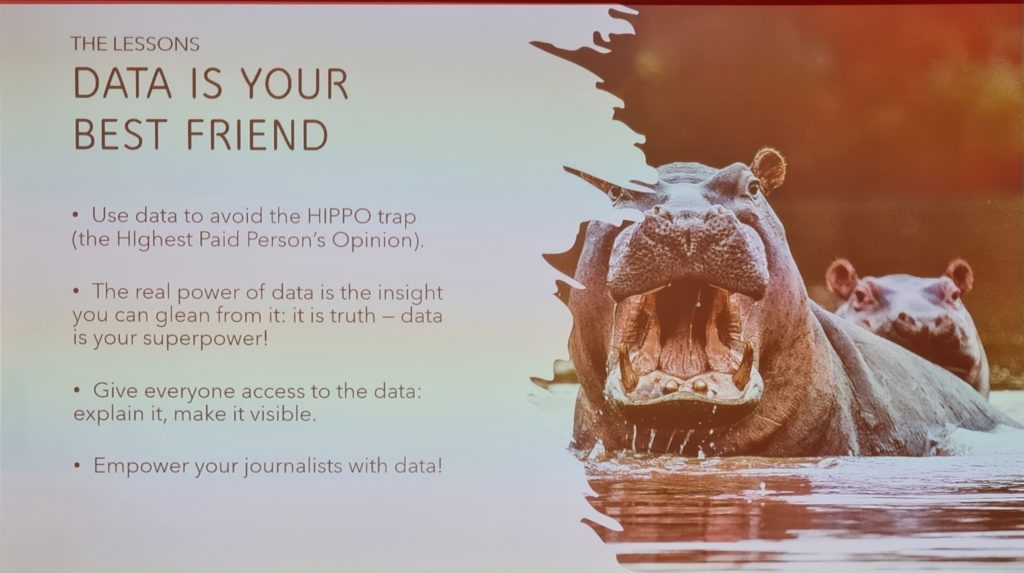|
Getting your Trinity Audio player ready...
|
FIPP’s World Media Congress in Cascais, Portugal, started with a preliminary session on Tuesday afternoon looking at publisher first-party data.
If there were two points drummed home by many of the presenters it was these: stop leaking data and don’t give away data for free.
On the first full day of the conference, the theme was further taken up by Alysia Borsa, Chief Business Officer and President of Lifestyle at Dotdash Meredith. Speaking via Zoom relayed to the main Congress theatre, Borsa said that the publisher will not give away data for free across any of its brands, an underlying formula that helps Dotdash Meredith sustain all-important consumer trust.
Borsa echoed what Martha Williams, CEO of the World Newsmedia Network, emphasized to the assembled publishers at yesterday’s session on first-party data, namely that there must be a clear value exchange made between a publisher’s audience and any request for personal data. As publishing moves to an ecosystem based on first-party data, this will become increasingly important.
The theme of the importance of data was simultaneously taken up by Miranda Holt, who is the external partners lead at the BBC’s 5050 project whose goal is to increase the representation of women in content output. A mere 5 years on, 5050 has expanded around the world with multiple new media partners with data being at the core of the initiative.
The importance of nurturing talent
The importance of retaining and nurturing staff was taken up by Professor Lucy Keung, a senior research fellow at the Reuters Institute. Keung argued strongly that the new generation of talent coming through are looking for leaders who are “high on IQ but low on ego”. Moreover, they want to be led and to be inspired, and certainly not micromanaged.
Keung finished with a stark warning that in a hugely competitive job market, publishers can’t afford to lose their best talent and that they must guard against burnout, saying, “The lower you go down in a publisher organization, the more burnt out the staff are. During this choppy socioeconomic time, you must look after your staff properly. Otherwise, they’ll simply leave.”
Keung added that publishers base their strategic planning on a staff operating on “full cylinders and with plenty of energy reserves, and that is simply not the case.”
Individuals don’t join organizations, they join other people.
Professor Lucy Keung, Senior Research Fellow, Reuters Institute
The theme of looking after publisher talent was a question put to Srini Balasubramanian, Managing Director of the 96-year-old Vikatan Group based out of Chennai, India. Under his stewardship, the Vikatan Group today is a diversified Media house with over 720 million minutes viewed by its 20 million followers across social networks every month.
Part of this success is down to Vitakan Group’s own social media influencers becoming stars in their own right. When asked if the publisher was afraid of these influencers leaving to become their own bosses, Balasubramanian admitted that it was a “risk worth taking”.
It’s better having the cannibal in your own house.
Srini Balasubramanian, Managing Director, Vikatan Group
Digital Transformation
Ralph Büchi, Chairman of the Supervisory Board of Axel Springer, took to the stage at FIPP’s World Media Congress to announce that “the next digital transformation is upon us”.
Büchi’s comments deserve attention, not least because he oversees the largest publisher in Europe, with more than 16,000 staff and numerous multimedia news brands including Bild, Die Welt, and Fakt.
In 1999 our digital share of revenues was just 1%. Today we have over 1M digital subscriptions, and 400 M unique users per month. However, producing and distributing content has never been easier for individuals; the middle man has been cut out. We have to rethink the relevance of media brands if we don’t want to go the same way as travel companies.
Ralph Büchi, Chairman of the Supervisory Board, Axel Springer
The theme of digital transformation was taken up by Denis Haman, CEO of Glide Publishing who has worked with the Daily Mail to help the publisher grow its digital subscriptions by 300% using a strategy based on moving quickly, learning fast and pivoting quickly.
Once again, the emphasis was on using data to make the right decisions and to create a culture based on openness, curiosity, as well as giving everyone access to the data within an organization.

The final words of the day need to go to Juan Senor, President of Innovation Media Consulting, who is the co-author of the newly released Innovation in Media 2022/23 report. Talking about research undertaken on paywalls, Senor said that the balance between acquisition and retention was paramount, with dynamic paywalls the optimal solution.
He also served up a warning to attendee publishers to use AI with care.
AI is an increasing priority area for publishers in delivering personalisation and content recommendation, but AI has no conscience, and having a conscience is the key.
Juan Senor, President, Innovation Media Consulting



